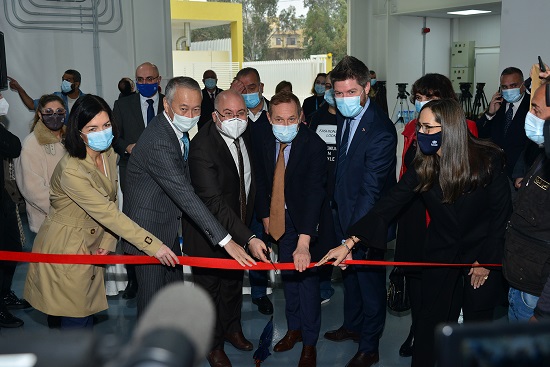
Beirut, 10 March 2022 – Today marks the handover of the Ministry of Public Health’s central drug warehouse in Qarantina, one and a half years after it was destroyed by the explosion in Beirut port.
Early in 2020, WHO initiated the expansion of the warehouse from 600 m3 to around 2000 m3. However, the work was put on hold by the devastating explosion in August 2020. In response, a new plan was developed aimed at fully reconstructing the warehouse and increasing the storage capacity to 8 000 m3, as well as modernizing its storage and distribution capacities.
“Within our support to the people living in Lebanon who are burdened under so many difficult livelihood circumstances, we prioritized our efforts to ensure that this medicine hub that gives relief to people is restored and upgraded to serve faster, better and leave no one behind,” said Dr Iman Shankiti, WHO Representative in Lebanon.
The team of engineers supervised by WHO rebuilt the warehouse with the highest standard and safety measures. Bloc A houses the cold rooms, short-term storage, order preparations, with office spaces on the higher floors; Bloc B is dedicated to long-term storage and has safe rooms for high-value medications.
Through the support of UNICEF, 14 refrigeration rooms were also rebuilt at the warehouse and linked to a solar power system to guarantee the safe storage of all vaccines.
“The restoration of the cold rooms at the central drug warehouse was critical to ensure the safe delivery of vaccines to support the routine immunization of children and mothers, as well as the country’s COVID-19 vaccination campaign,” said Ettie Higgins, UNICEF Representative in Lebanon. “We are extremely grateful to the Government of Australia for having provided critical funding to restore the cold chain for vaccines.”
The whole project was made possible through the generous funding from the Government of Japan, the State of Kuwait and WHO emergency funding, while Australian Aid through UNICEF provided 12 cold rooms, 2 refrigeration rooms and a photovoltaic electricity system (with solar source of electricity) as per WHO recommendations on sustainability and clean sources of energy. The structure also includes a server room to operate the new fully-automated logistic management system and provide backup for the servers located centrally at the Ministry of Public Health in Bir Hassan.
“This project is an integral part of the process of the storage and delivery of essential medications and medical supplies to patients. We thank our partners for their support in rehabilitation of the physical part of this process, and pledge to continue working with them on the digital transformation of our logistics to ensure a transparent, efficient and timely distribution practice,” said Dr Firass Abiad, Minister of Public Health.
The new capacity of the warehouse allows for the storage of medication supplies and vaccines that can serve over 1 million beneficiaries either directly or through 830 primary health care centres, dispensaries or mobile clinics across the country. The storage of the warehouse is almost at full capacity with essential medications for chronic, acute and mental health conditions, as well as vaccines, which are provided through generous support from the European Union and distributed through primary health care centres in Lebanon.
For further information, please contact:
WHO Communication Officer
Hala Habib
+961 3 870 459
UNICEF
Maya Outayek
+961 70190634









